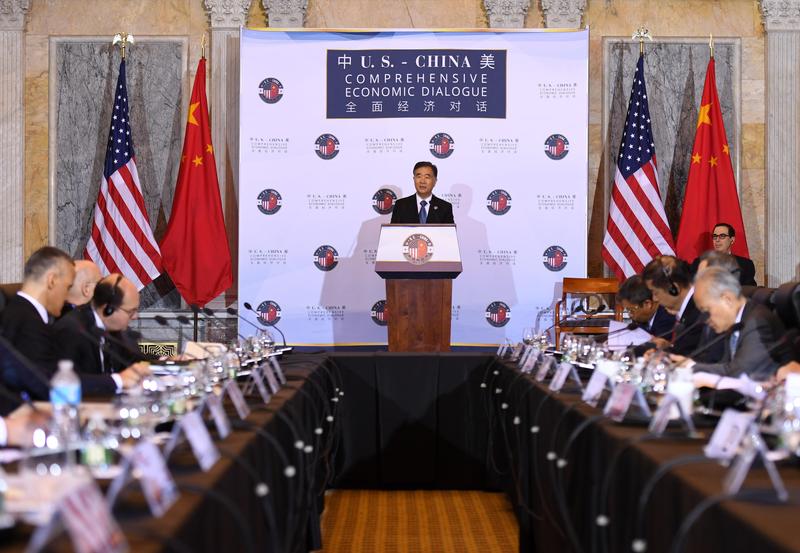
Economist Michael Ivanovitch comments on CNBC: Last week's U.S.-China Comprehensive Economic Dialogue could mark the beginning of a more constructive and balanced bilateral trade relationship. Both countries realize that the existing trade imbalance is unsustainably large and disruptive for their more stable political and security ties. In the case of China, the current state of economic exchanges with the U.S. runs counter to Beijing's fundamental foreign policy doctrine — "win-win cooperation" — enshrined in documents of the country's highest executive and legislative authorities.The solution path, however, will be long and will require major structural adjustments in both economies. According to last week's statements by China's President Xi Jinping, Beijing wants to keep an open system of international trade and investments. That policy was re-stated by the Chinese trade delegation that ended its negotiations in Washington last Wednesday. "A one-year action plan" was discussed with the U.S., they said, with particular emphasis on expanding "trade in services, civilian hi-tech and agriculture."
Financial Times comments that when Chinese president Xi Jinping landed in Moscow on the eve of the G20 summit for two days of talks with his Russian counterpart Vladimir Putin, the world paid little or no attention. Compare that with the breathless coverage of Donald Trump's meeting with the Russian leader days later. Cooler heads in the Kremlin, however, recognise that the meeting between Messrs Putin and Xi was where the real action was. Beijing and Moscow are stealthily scaling up their co-operation in areas that are likely to pose challenges to western interests and policies. The dominant view in the west is that the "bromance" between Mr Putin and Mr Xi masks an awkward relationship, in which mutual trust is conspicuously absent. But this obscures a more complex picture. The truth is that Russian and Chinese national interests tend to coincide precisely in areas where they oppose those of the west...Hawks in the Russian and Chinese national security establishments are united in their belief that Washington is using the North Korean nuclear problem as a pretext to put more military pressure on both countries by deploying the Thaad missile defence system. Both see a nuclear-armed Mr Kim as a far lesser threat than a growing American military presence at their doorstep. Mr Putin and Mr Xi spent much time in Moscow discussing those issues and are presenting a united front to block US moves on North Korea...Co-operation between China and Russia might be transactional, but it has geo-strategic consequences. At times, Mr Putin and Mr Xi have found an unlikely ally in Mr Trump. The latter's clumsy approach to foreign policy and fractious relations with long-time allies leave the west poorly equipped to push back. Nor should we expect that an increasingly isolated US administration will have the political capital to manage conflict and competition between great powers in the post-cold war era.
- 2017-07-21 China's navy expands reach: Ships in Baltic for drills with Russia
- 2017-07-20 Trade talks fizzle as China rebuffs key Trump team demand
- 2017-07-19 U.S., China talks seen offering small-scale market access deals
- 2017-07-18 How to persuade China to abandon North Korea
- 2017-07-17 China upset about 'negative' Taiwain content in U.W. defense bill
- 2017-07-16 US-China Trade Talks Sputtering at 100-Day Deadline
- 2017-07-14 China Changes How It Calculates GDP for First Time Since 2002
- 2017-07-13 China June exports, imports higher than expected as global demand holds strong
- 2017-07-12 China sends troops to Djibouti, establishes first overseas military base
- 2017-07-11 China says 'China responsibility theory' on North Korea has to stop
- www.bbc.com South China Sea: Vietnam halts drilling after 'China threats'
- Reuters China's debt specter could haunt Fed's policy meetings
- Fox News American student stuck in China jail for days is freed, senator says
- Forbes Oil: The Philippines Is Challenging China Again Over A Disputed Sea
- Bloomberg China Joins Global Puzzle of Elusive Raises Amid Ample Openings
- The Guardian Chelsea apologise to Chinese fans over Kenedy's 'offensive' Instagram posts
- Bloomberg Bordeaux Wine Estate Chateau Fauchey Sold to Chinese Investor
- Wall Street Journal China's Latest Clampdown on Overseas Investing Has President Xi's Approval
- Financial Times China embraces era of employee-free retail shopping
- abcnews.go.com Justin Bieber not welcome to perform in China
- The Washington Post How to make $100000 a month in China, live-streaming your life
- New York Times Review: US Youth Orchestra Inspires a Chinese Counterpart
- Bloomberg China Aims to Build Leading AI Industry
- economictimes.indiatimes.com Indian, Chinese diplomats must prevent war: Chinese expert
- Wall Street Journal Countering China in Indian Ocean Proves Tall Order for Japan and India
- Forbes What's Next For US-China Trade After Collapse Of Talks
- nationalinterest.org How Japan Could Sink China's Navy in a War: Ramjet Missiles
- nationalinterest.org China's Strategy in Asia Is Simple: Kick America Out
- Forbes US Can Now Ship Rice To World's Largest Consumer, China - A Tale Of Technical Trade Barriers
